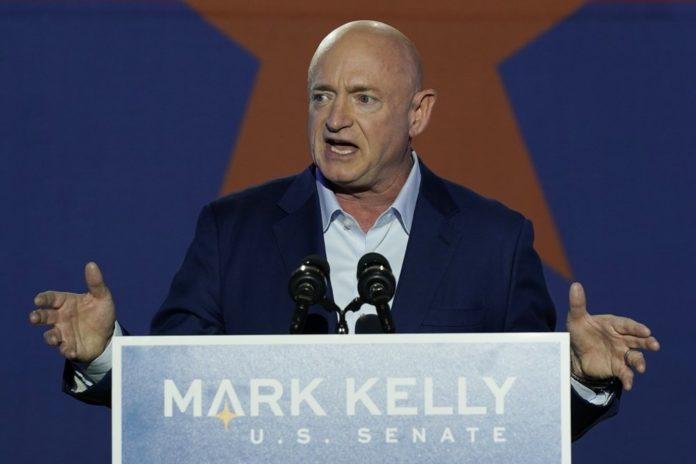
A changing electorate in Arizona handed historic victories to Democrats in the former Republican stronghold, with Joe Biden becoming only the second Democratic presidential candidate since 1948 to win the state and retired astronaut Mark Kelly giving the party both Senate seats for the first time in nearly 70 years.
The extraordinary turn of events had been building for some time in a state long associated with late Sens. Barry Goldwater and John McCain, who were the Republican nominees for president in 1964 and 2008, respectively.
Democrats benefited from Arizona’s changing demographics, with more young people and Latinos registering to vote, an influx of new residents and unease among some suburban women about President Donald Trump.
Trump and his allies made an aggressive, but ultimately futile, push to hold on to Arizona, which he won by 3.5 percentage points in 2016.
In a narrowing presidential contest, Biden collected Arizona’s 11 electoral votes by winning over swing voters who split their tickets two years ago to elect a Republican governor and a Democrat to the U.S. Senate.
Meanwhile, Kelly beat Republican Sen. Martha McSally for the seat once held by McCain, a popular senator who often sparred with Trump. The senator’s wife, Cindy McCain, threw her support behind Biden, citing the president’s disparagement of her husband.
McSally was appointed to McCain’s seat following his death two years ago. She had lost in 2018 to Kyrsten Sinema, who became the first Democrat to win a U.S. Senate seat in Arizona in 30 years — a race that illustrated the changing nature of the state.
Arizona hasn’t had two Democratic senators since Earnest McFarland lost his reelection bid in 1952. Tuesday’s win by Kelly, who will join Sinema in Washington, could prove crucial in determining which party controls the Senate.
Kelly is perhaps best known in Arizona for being married to former U.S. Rep. Gabrielle Giffords, who was shot in the head in 2011 in an assassination attempt in Tucson.
Before the race was called, Kelly said he was “confident that when all the votes are counted, we’re going to be successful in this mission.”
The state was in play down the ballot, giving Democrats a realistic shot even at winning control of the state Legislature. Voters also approved an initiative allowing Arizona to join other states that have legalized recreational marijuana.
Arizona voters were in a negative mood as they chose their president, according to AP VoteCast, a survey of more than 132,000 voters and nonvoters nationwide conducted for The Associated Press by NORC at the University of Chicago. The survey shows that 61% of Arizona voters said the U.S. is on the wrong track, while 39% said it is headed in the right direction.
But they also were motivated. Election officials in Maricopa County, the state’s most populous, said multiple voting locations with people still in line when they were set to close at 7 p.m. remained open as required by state law.
Carla Retana, who turned 18 on Election Day, called it “amazing” to cast a ballot on her birthday.
She was with her cousin, Anthony Medina, who turned 18 four months ago. Registered independents, they both voted for Biden.
“Our current president has said so many bad things about Hispanic people, Black people, calling our current virus the ‘Chinese virus.’ I couldn’t really side with him,” Medina said.
Brandon Ross, 27, a financial adviser and Republican, said he voted for Trump as he did in 2016. He said he understands Trump’s demeanor rubs people the wrong way but said his policies on the economy and civil liberties are what matter.
“What he supports is by and large what I support,” Ross said.
Statewide participation was high, with nearly 62% of voters casting their ballots either by mail or in-person by Monday morning.
Speaking early Wednesday from the White House, Trump said many votes were outstanding and “there’s a possibility, maybe even a good possibility” that he could win despite the deficit.
Bill Clinton was the most recent Democratic presidential candidate to take Arizona, winning with 46% of the vote in 1996, helped by Ross Perot’s strong third-party bid. Before that, the last time Arizona selected a Democrat for president was in 1948 with Harry Truman.
The makeup of the state’s U.S. House delegation also had been on the line, with all nine incumbents facing challenges. But reelected were Republicans Debbie Lesko in the 8th Congressional District, Paul Gosar in the 4th District and Andy Biggs in the 5th.
Democrats Ann Kirkpatrick in the 2nd District, Raul Grijalva in the 3rd, Ruben Gallego in the 7th and Greg Stanton in the 9th kept their seats.
However, Republican Rep. David Schweikert, haunted by an ethics probe, was in a close race against Democrat Hiral Tipirneni in a district that has historically favored the GOP.
Republicans hoped to topple Democratic Rep. Tom O’Halleran in the 1st District.
Republished with the permission of the Associated Press.












